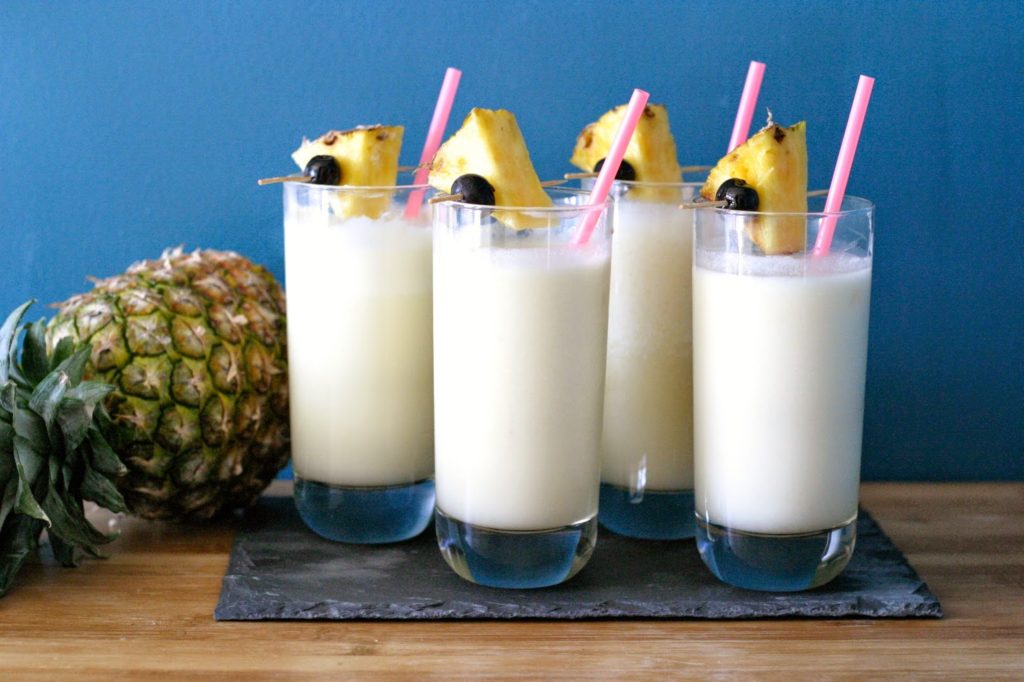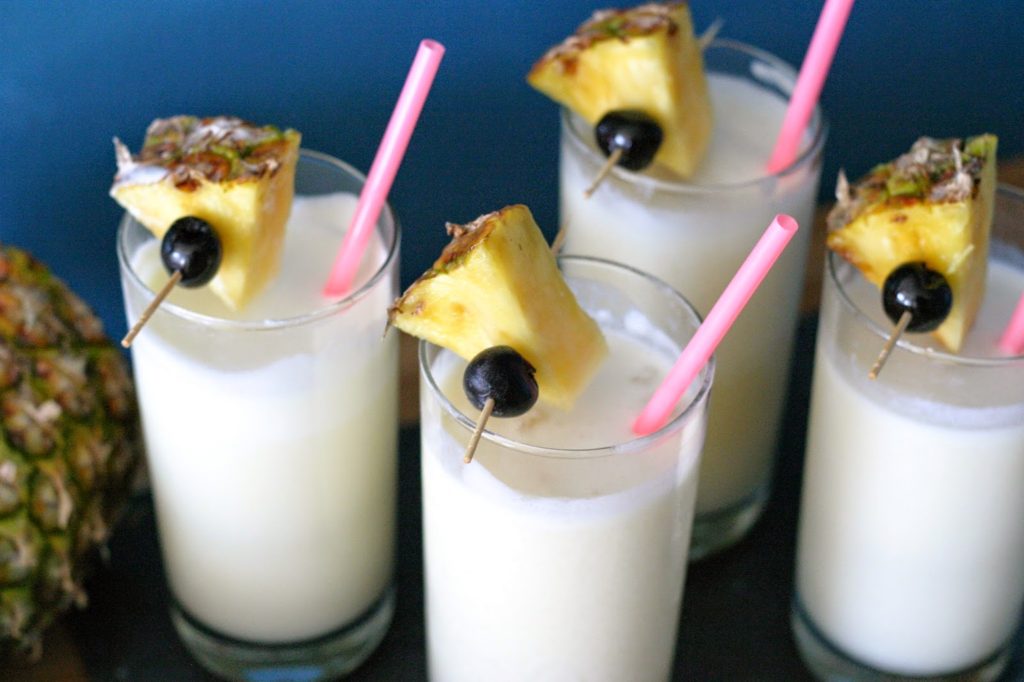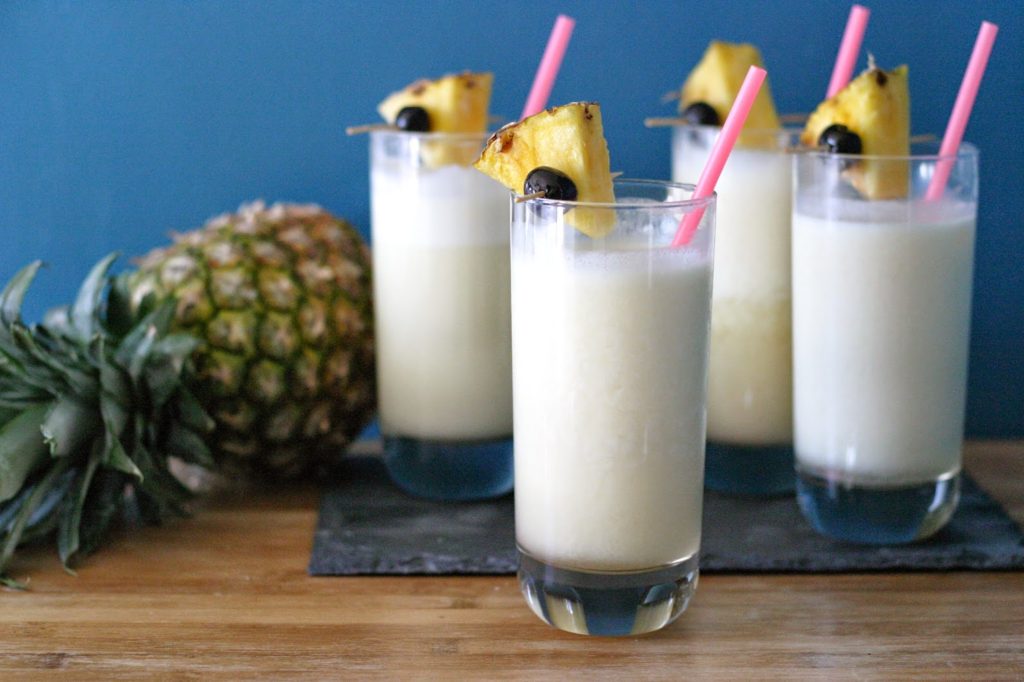When I first started drinking, I loved the really sweet stuff. The first things I bought for my bar were Midori, Malibu, and Peach Schnapps. Now the thought of making any of those things the main ingredient in a cocktail makes me nauseous. I guess it’s a natural progression.
But that’s not to say that sweet, tropical drinks don’t have a place in an “adult” cocktail repertoire. Some, like the Mai Tai and the Daiquiri and the Singapore Sling, are still considered respectable when made correctly. Tiki bars seem to be experiencing a small resurgence in our current retro-obsessed craft-cocktail movement (most recently, I went to Beachbum Berry’s Latitude 29 in New Orleans and want to go back and try every single thing on the menu). And finally, there are the drinks that are just too good to give up on. The ones that might be meant for sitting beachside but are honestly just as good if you’re on your couch. The ones you want to drink in large quantities following a breakup (because whiskey would just be too much of a downer).
The Pina Colada is one such drink.
Say whatever you will about it. I love Pina Coladas (but not getting caught in the rain, that kinda sucks). And there is no way I was going to leave it off of my list of cocktails just because it’s a little frou-frou. No. I insist that the Pina Colada is a perfectly respectable cocktail. And I’m going to keep making them. So there.
History: The Pina Colada was (probably) invented in Puerto Rico in the 1950’s or 60’s. I say probably because there is a popular legend that it came about long before this, and – like any really good legend – it involves pirates. Specifically, El Pirata Colfresi, Roberto Colfresi. He turned to piracy after his wealthy Puerto Rican family went bankrupt. After the death of Jean Lafitte in 1823, he became the biggest pirate threat in the Caribbean. Legend says that he would give his men a mixture of coconut, pineapple, and rum to improve morale. And thus the Pina Colada was born. Unfortunately, it died with Colfresi as well, when he was executed in 1825.
Much as I love the image of a grisly pirate sipping on a refreshing Pina Colada with a little umbrella in the cup, there isn’t really much to back up this story. And even if was true, the recipe was lost. But if you’d like to cling to this bit of Puerto Rican folklore, perhaps it isn’t so much who invented the Pina Colada in the 1950’s as who rediscovered it.
There are three contenders. First, we have Ramon “Monchito” Marrero Perez, a bartender at the Beachcomber Bar in the Caribe Hilton of San Juan. He is credited with introducing the new drink in either 1952 or 1954. A fellow named Jose L. Diaz de Villegas, supposedly a friend of Monchito’s, recently co-authored a book on Puerto Rican cuisine, Puerto Rico: La Gran Cocina del Caribe (in English here). He provides what he considers to be the original recipe. I haven’t gotten my hands on a copy of the book yet to confirm that he really does claim to have known Monchito.
Others claim it was not Monchito at all who introduced the Pina Colada at the Caribe Hilton, but a Spanish bartender named Ricardo Garcia. The story goes that he was unable to make the bar’s signature drink, the Coco Loco, because the coconut plantation workers had gone on strike. (The bar usually hollowed out a coconut to serve the drink in.) So the resourceful Garcia hollowed out pineapples instead, added some pineapple juice to the mix, and invented the Pina Colada.
Finally, the Barrachina Bar in San Juan also claims credit for the cocktail. Their bartender Ramon Portas Mingot may have invented it in 1963. That’s an awfully big time gap for something as delicious as the Pina Colada to stay out of the historical record, but who knows. Maybe everybody was too drunk to write anything down about it.
Pina Colada
1 1/2 oz. white or golden rum (or half and half)
3 oz. coconut cream
6 oz. pineapple juice
~3/4 cup ice
Combine ingredients in a blender and blend until smooth. Garnish with a slice of pineapple and a cherry. Don’t be ashamed – it’s delicious.
Recipe from Wikipedia, probably taken from Puerto Rico: La Gran Cocina del Caribe.









Science, my favorite thing! Gotta love the pink straws, too…